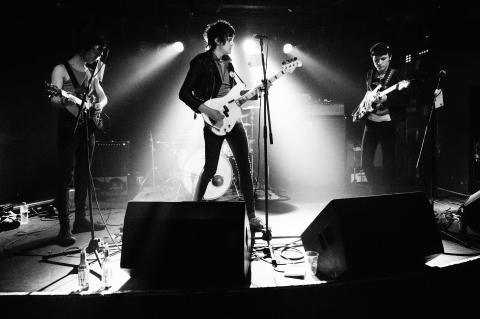Aldous Huxley had it that, and I’m paraphrasing here, our friends serve as an entity we inflict upon that which we cannot inflict upon our enemies. If that’s true, then punk rock has been our friend for far too long. It started out as the enemy with proto-punk in a time when bands like Death (from Detroit, not the Floridian progenitors of death metal), the Stooges and the MC5 stalked the earth with great gargantuan fuzz boxes buzzing and driving beat cylinders firing, flexing terrible Michigan-bred muscle.
Then as soon as the Ramones and the Sex Pistols broke big, right around ‘76 and ‘77, it was over. Commodified, punk rock became our friend. And we inflicted, knowingly or not, death by a thousand cuts — torturous and drawn out to the point where punk didn’t actually die. It just bled out and diluted to a chalky white, opaque shadow of its former self so unrecognizable that when kids passed it on the now disgustingly pristine street they mistook it for Green Day and Blink-182. Punk rock became the veritable soma we dose ourselves with, while we’re on this Huxley trip, via the comatose commercial radio waves. Instead of screaming bloody discontent, punk made us believe everything was gonna be OK; that’s just wrong.
So it’s like a welcome slap in the face — a much-needed, stinging wake-up call — when a band like Berlin’s Modern Pets comes along. Henry Rollins used to make fun of people who said punk was better in ‘77 while he was still in Black Flag. But ol’ Hank couldn’t have envisioned a world in which punk would be filtered through his own Hollywood jock strap. Modern Pets puts some snarl back into it. For them, saying punk was better in ‘77 isn’t some pseudo-ironic statement ripe for mockery. It’s a simple statement of fact.

Photo Courtesy of Andrea Shettler.
“It´s the energy and our contempt for society and everyday life that always keeps us coming back for more and releasing all our frustration through shredding through these famous three chords,” says bassist/vocalist Automatic Axel of what brought them to their mix of surf meets The Damned in a haze of ‘60s garage rock.
It’s a sound that has seen the band make a nice name for itself on home soil — a name big enough to garner opening slots for the likes of the Misfits, Total Chaos and Jello Biafra. In fine, snotty fashion, the band took nothing away from the experience of opening for these legends of punk rock save a healthy dose of disdain.
“What do you expect if you share the stage with some 60-year-old farts that only came back to life to make some money?” Axel asks rhetorically.
“Our drummer once stole a snare stand of the Misfits on a big festival in Germany, that´s probably the best story.”
Berlin has something Taipei has only flirted with on the most cursory level — an active punk scene — with multiple shows every night of the week that young punks and hardcore kids can go to, get inspired by, pick up instruments for, start bands of their own and perpetuate the cycle of never-ending adolescent angst. If that seems derisive, it’s not. Anyone who ever changed the world never let go of what they knew was true when they were in the grips of their pre-teen and teenage years. They might have evolved it into something more focused, more mature. But they never lost it. Being part of such an active scene, the four-piece, all of whom are not originally from Berlin, find that their adopted home drives them forward.
“It pushes and inspires, yes!” says Axel of Berlin as muse to the punker. “This city [has] a long history of underground music and also there’s always new people from all over the world coming here and bringing new influences, starting new bands and projects, which is really nice and keeps you busy.”
The Berlin scene is also known for its politically-conscious brand of punk band. Punk always has its mix of nihilism and counter-culture flag-waving. It’s the Hunter S. Thompson of music. Does it care too much, or just want to flush itself away in a haze of booze, pills and magic potions? Maybe it’s somewhere in between. Modern Pets prefer not to be drawn into the question at all. Politics plays a role in everything we do, and everything we say. But for the most part, Modern Pets keeps music and politics deliberately separate, as far as that possibility extends.
“As the punk scene in Germany is a quite political one for good reason, some of us are having a political punk background,” says Axel. “Still, it’s not a major theme in Modern Pets to talk about political issues in our songs. We mostly talk about everyday life and private experiences as well as invented characters and more arty and funny or weird stuff.”
This month Modern Pets are on tour in Taiwan and Japan. Having trekked several times across Europe and to the US, wild stories of the road are nothing new. But if you want to know what touring is really like, start your own band and get out there. Maybe someday you’ll have your own punk rock yarns to spin. They might go something like this Modern Pets collage of excess and poverty.
“One of the best was when a granny in Reno, Nevada bought all of us a massive breakfast ‘cause she just won the lottery. And then there´s people with no cellphones getting lost in the South California desert, getting almost retarded on Four Loko, having group sex in the toilet, snorting three-feet-long lines and so on. Feel free to guess the wildest stories around it now, we won’t tell more!”
■ Modern Pets play tonight at Revolver, 1-2, Roosevelt Road, Sec 1, Taipei City (台北市羅斯福路一段1-2號). Support comes from Pa Pun (怕胖團). Tickets are NT$400 in advance, NT$500 at the door, and the doors open at 9:30.

When the South Vietnamese capital of Saigon fell to the North Vietnamese forces 50 years ago this week, it prompted a mass exodus of some 2 million people — hundreds of thousands fleeing perilously on small boats across open water to escape the communist regime. Many ultimately settled in Southern California’s Orange County in an area now known as “Little Saigon,” not far from Marine Corps Base Camp Pendleton, where the first refugees were airlifted upon reaching the US. The diaspora now also has significant populations in Virginia, Texas and Washington state, as well as in countries including France and Australia.

On April 17, Chinese Nationalist Party (KMT) Chairman Eric Chu (朱立倫) launched a bold campaign to revive and revitalize the KMT base by calling for an impromptu rally at the Taipei prosecutor’s offices to protest recent arrests of KMT recall campaigners over allegations of forgery and fraud involving signatures of dead voters. The protest had no time to apply for permits and was illegal, but that played into the sense of opposition grievance at alleged weaponization of the judiciary by the Democratic Progressive Party (DPP) to “annihilate” the opposition parties. Blamed for faltering recall campaigns and faced with a KMT chair

Article 2 of the Additional Articles of the Constitution of the Republic of China (中華民國憲法增修條文) stipulates that upon a vote of no confidence in the premier, the president can dissolve the legislature within 10 days. If the legislature is dissolved, a new legislative election must be held within 60 days, and the legislators’ terms will then be reckoned from that election. Two weeks ago Taipei Mayor Chiang Wan-an (蔣萬安) of the Chinese Nationalist Party (KMT) proposed that the legislature hold a vote of no confidence in the premier and dare the president to dissolve the legislature. The legislature is currently controlled

Dull functional structures dominate Taiwan’s cityscapes. But that’s slowly changing, thanks to talented architects and patrons with deep pockets. Since the start of the 21st century, the country has gained several alluring landmark buildings, including the two described below. NUNG CHAN MONASTERY Dharma Drum Mountain (法鼓山, DDM) is one of Taiwan’s most prominent religious organizations. Under the leadership of Buddhist Master Sheng Yen (聖嚴), who died in 2009, it developed into an international Buddhist foundation active in the spiritual, cultural and educational spheres. Since 2005, DDM’s principal base has been its sprawling hillside complex in New Taipei City’s Jinshan District (金山). But